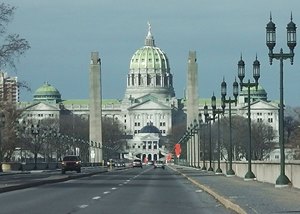Pennsylvania Governor Wants to Raid Racing, Breed Funds


In his budget address Feb. 4 in Harrisburg, Pennsylvania Gov. Tom Wolf proposed ending all Pennsylvania Race Horse Development Fund payments to purses and breeder funds and redirecting that $204 million to college scholarships.
Pennsylvania Horsemen's Benevolent and Protective Association executive director Todd Mostoller didn't mince words in what such a move would mean for racing and breeding in the state: "We'd be out of business."
Mostoller, who helped craft the fund which uses money from added gaming at tracks to fund purses and encourage breeding, added that he thinks the Pennsylvania General Assembly will not move forward on the proposal.
"I don't think it has much chance," Mostoller said. "We have some champions in the State Senate and House who we'll need to step up."
Speaking with lawmakers during his budget address Tuesday, Wolf, a Democrat from York County, said he would like to create a tuition program that would support students in Pennsylvania's State System of Higher Education. He would fund it with money currently going to racing and breeding.
"I'm proposing a historic $200 million investment in scholarships for the young Pennsylvanians attending our state system universities. That will mean 25,000 (PASSHE) students ... will be able to get a degree without crushing debt. We'll do that by repurposing existing tax dollars that are right now flowing into the horse racing development fund. Let's bet on our kids instead of bankrolling racehorse owners and ensure the viability of Pennsylvania's state system of higher education."
In the governor's executive budget for 2020-2021, it proposes taking all $204,199,000 that would go to race purses and breeding programs and commit that money to the Nellie Bly Tuition Program. In the previous fiscal year, the race horse development fund saw $162.7 million committed to Thoroughbred and Standardbred purses while $32,543,000 was committed to breeding programs (Thoroughbred and Standardbred).
In 2019 the fund accounted for about 90% of the purse money awarded in Thoroughbred racing.
Pete Peterson, executive director of the Pennsylvania Equine Coalition, which represents the Thoroughbred and Standardbred industries in the state, said such a raid would have a devastating effect on racing and breeding and would negatively impact the state's economy—especially agriculture.
"If approved by the legislature, this raid would result in the end of horse racing in Pennsylvania by eviscerating the primary funding source for the purses and breeder incentives that serve as the lifeblood of the industry," Peterson said in a release. "This scheme would destroy an industry that provides a $1.6 billion economic impact and supports an estimated 16,000 to 23,000 jobs in the agriculture, manufacturing, construction, retail, and hospitality industries here in Pennsylvania.
"Race horse owners and breeders whose operations preserve 100,000 acres of open space in Pennsylvania would be put out of business," continued Peterson. "Hundreds of farmers who preserve tens of thousands of additional acres growing crops such as straw for bedding and alfalfa and other feed products for horsemen—their largest and highest-paying customers—would face financial ruin. This anti-agriculture budget could not come at a worse time for many Pennsylvania farmers who are already struggling financially, as evidenced by a 20% increase in farm bankruptcies in 2019."
The Pennsylvania HBPA and the Pennsylvania Horse Breeders Association have both worked hard to educate the public and lawmakers about the benefits of the money that has been committed to the industry. The Pennsylvania HBPA notes that racing contributes to $1.6 billion in economic activity each year and that 18% of the total acres in the agricultural preservation program are equine related. It has noted that horsemen have reinvested 89% of the money paid by the fund into local economies and that more than 23,000 people work in the state's racing industry.
Industry leaders say that just the breeding side generates $193 million in economic impact annually and accounts for 2,800 jobs.
"I wish the governor would get out to our tracks and see the hard-working people who are there," Mostoller said, noting that the governor frequently characterizes such horsemen as rich.
While Mostoller believes lawmakers will not move forward on the governor's proposal to raid the fund, he also believes the fund is protected by law from such raids. Should lawmakers move forward on the governor's proposal, he envisions a court fight.
The governor's proposal would not touch the more than $8.5 million in fund money committed to horsemen's health and pension benefits.
